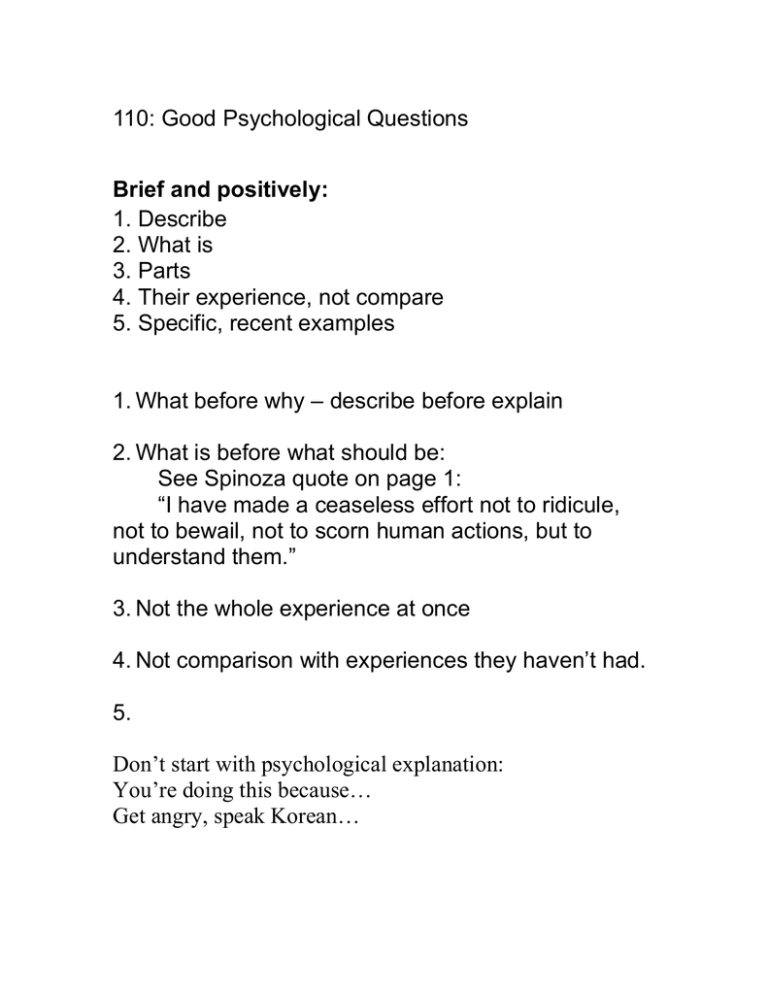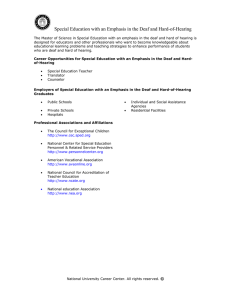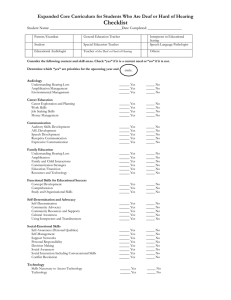110: Good Psychological Questions 1. Describe 2. What is
advertisement

110: Good Psychological Questions Brief and positively: 1. Describe 2. What is 3. Parts 4. Their experience, not compare 5. Specific, recent examples 1. What before why – describe before explain 2. What is before what should be: See Spinoza quote on page 1: “I have made a ceaseless effort not to ridicule, not to bewail, not to scorn human actions, but to understand them.” 3. Not the whole experience at once 4. Not comparison with experiences they haven’t had. 5. Don’t start with psychological explanation: You’re doing this because… Get angry, speak Korean… 1. Explain: Ok to get details, circumstances, Don’t start with psychological explanation: You’re doing this because… Good secondary questions: When did you learn? When did you feel transition? Not much response to them. Mother Father Deaf: Living between Sound and Silence. Paul Preston. Harvard U. Press, Cambridge MA, 1994 p.45 What do you ask first? The experience of being asked outside in, not inside out: you may want the experience, but you get the interpretation of the experience, the response to others’ views of the experience Terry’s example is a good one : his mom’s response to being tested about her memory impacted the whole memory process - you need to deal with that before you can deal with the actual memory loss. Why? Key theme: we are sense-making beings, probably 1st and foremost pages 53-55 - stigma management Who are you in relation to the participant? Insider / Outsider: Each has it’s issues and from 49/50 note: there was no place where talking would help. Hearing people kept making us feel different. The experience of difference is early, and needs to be understood and related to before we can get to experiences of deafness. Reason identity (difference) is not articulated highly personal No one to talk to? With those who understood - no need to With those who didn’t - not possible Quote: Accountability Considering the contemporary Western (particularly American) propensity to probe and analyze one’s family of origin, several informants wondered at their lack of questioning about their childhoods. Eileen shook her head as she asked why she had never talked about this with her how siblings or with other hearing children of deaf parents: “You’d think we would’ve talked about all this, but we never did…It never occurred to me. As children, many informants felt their situation was unique - even if they had hearing siblings or knew other hearing children of deaf parents. They describe a highly personal sense of deafness - despite situations and environments that were frequently parallel to those of other hearing children of deaf parents. Only as adults did many informants feel that they were motivated to examine their experiences, to learn about deafness, or to talk with other hearing children of deaf parents. Gloria explained: When we were at the Deaf club, or when it was just me and my sister, we didn’t need to talk about our deaf parents. I mean, that’s just the way it was. And we certainly didn’t want to talk about it with hearing people. They were the ones who kept making us feel different. Good secondary questions: When did you learn? When di dyou feel transition? Not much response to them. What are good examples of better questions? ADHD Not: Why can’t you concentrate? Not: do they distract easily Parts: Talk about a specific project they attempted Comparison: Don’t start with, where is it worse, where is it better? Think of different places – e.g. tell me about the last time you went shopping with him? Tell me about a task where they wanted to learn? (sometimes I start from the end) What did s/he get done? What else did they notice? What did s/he start intending to do? Not just what rules, but how to enforce theme – it’s not just yes/no Language : bi-lingual Not: what’s it like? (overall, not parts) Not: how’s it different than being monolingual? Do you have people you speak one language to, the other, both? Do you experience those relationships differently? (comparison) Didn’t go anywhere But she mentioned – (1) I don’t notice when I say word in Korean (to English friend) (2) How other responds …. And how that affects the relationship Do you dream in both languages? Begin to build set of questions – The process of negotiating with It’s not “should we or shouldn’t we”, it’s “how does it work well?” or “what kinds of things go together (this package or that package)? New thing: How do we integrate with what we already have? E.g. podcasting lectures, Not “do you believe in respect?” What does respect look like? The deaf experience one. (?) Not which personality is better (e.g. healthier, more successful, has happier & longer marriages), but how do you do each style well? Not which coping method is best, but how to choose the right one for the right situation, or what is the right mix? Can deaf people infer emotions from TV shows with sound turned off better than hearing people? Good question comparing regular sit com with cartoon makes it interesting (it’s an experiment) Not - what are the list of symptoms How are symptoms an answer to other problems? Not - how much can we change a person’s behavior through operant conditioning, but How does each change the other? What else happens in good application of conditioning?


